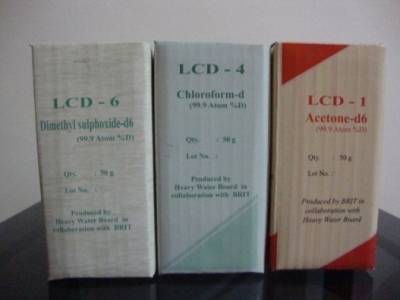Description
Deuterated Compounds: Isotopically Labeled for Enhanced Research
Deuterated compounds, also known as deuterium-labeled compounds, are molecules in which one or more hydrogen atoms (¹H, protium) have been replaced with deuterium (²H, D), a stable isotope of hydrogen. This subtle isotopic substitution profoundly impacts various spectroscopic and kinetic properties, making deuterated compounds invaluable tools across numerous scientific disciplines.
Why Use Deuterated Compounds?
The primary advantage of using deuterated compounds lies in their unique isotopic properties:
- NMR Spectroscopy: Deuterium's different nuclear spin (I=1) compared to protium (I=1/2) allows for the simplification of NMR spectra. Deuterated solvents, such as D₂O (deuterated water), are routinely used to suppress the strong protium signals from solvents, enhancing the visibility of the analyte signals. Specific deuteration patterns in molecules allow for the assignment and tracking of specific protons within complex structures.
- Mass Spectrometry: The increased mass of deuterium enables easy identification and quantification of compounds via mass spectrometry (MS). This is crucial for metabolic studies, drug metabolism research, and the analysis of complex mixtures.
- Kinetic Isotope Effects (KIEs): The substitution of deuterium affects the rate of reactions involving C-H bonds. Measuring KIEs provides valuable information about reaction mechanisms, transition states, and the role of specific bonds in chemical processes. This is particularly important in studying enzyme mechanisms and drug design.
- Internal Standard in Chromatography: Deuterated analogs serve as excellent internal standards in chromatography (GC, HPLC) offering improved accuracy and precision in quantitative analysis due to their similar chemical properties but distinct mass.
- Drug Metabolism and Pharmacokinetics: Deuterated drugs are used to study their metabolism and pharmacokinetics in vivo. The slower metabolism resulting from the kinetic isotope effect can lead to prolonged drug activity or reduced toxicity.
Types of Deuterated Compounds:
We offer a wide range of deuterated compounds, including:
- Deuterated Solvents: D₂O, CDCl₃, CD₃OD, DMSO-d₆, and many others, essential for NMR spectroscopy.
- Deuterated Internal Standards: Specifically designed for use in quantitative analysis via GC-MS or LC-MS.
- Deuterated Pharmaceuticals and Drug Metabolites: Used in drug discovery, development, and pharmacokinetic studies.
- Deuterated Biomolecules: Including amino acids, peptides, nucleotides, and sugars, useful in biological research.
- Custom-synthesized Deuterated Compounds: We offer custom synthesis services to meet specific research requirements, enabling the creation of uniquely deuterated molecules for specialized applications.
Purity and Quality:
All our deuterated compounds are rigorously tested to ensure high purity and isotopic enrichment. Detailed specifications, including isotopic purity and chemical purity, are provided with each product.
Applications:
Deuterated compounds find applications in diverse fields, such as:
- Pharmaceutical Research: Drug discovery, development, and metabolism studies.
- Biochemistry: Enzyme kinetics, metabolic pathway analysis, and protein structure studies.
- Chemical Research: Reaction mechanism investigations, and kinetic isotope effect studies.
- Environmental Science: Tracing environmental pollutants and processes.
- Materials Science: Studying polymer properties and material degradation.
Ordering Information:
For inquiries regarding pricing, availability, and custom synthesis, please contact our sales team. A comprehensive catalog of our deuterated compounds is available on our website. Safety data sheets (SDS) are provided for each product.
